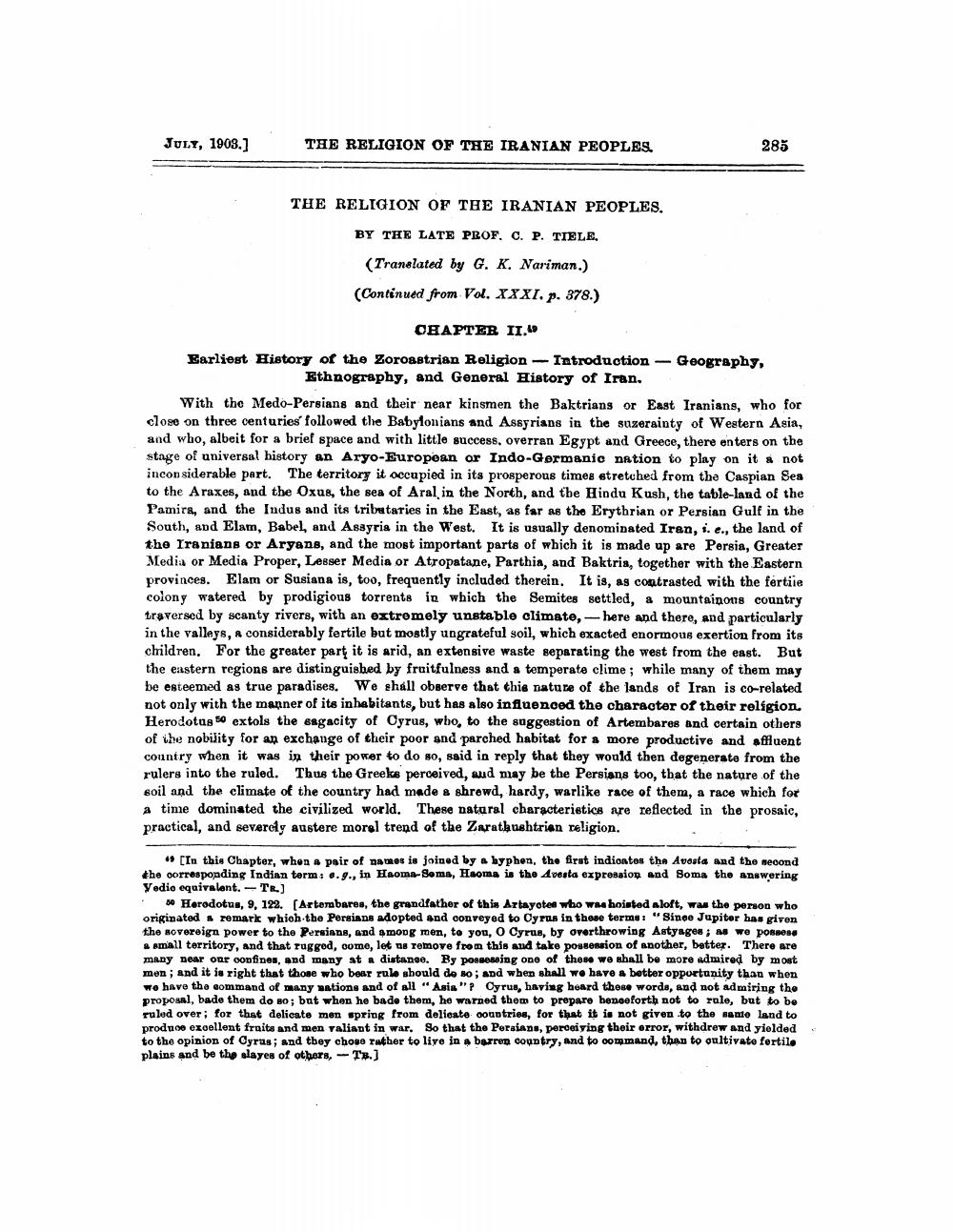________________
JULT, 1903.]
THE RELIGION OF THE IRANIAN PEOPLES.
285
THE RELIGION OF THE IRANIAN PEOPLES.
BY THE LATE PROF. C. P. TIELE,
(Translated by G. K. Nariman.) (Continued from Vol. XXXI. p. 378.)
ORAPTER II. Earliest History of the Zoroastrian Religion - Introduction - Geography,
Ethnography, and General History of Iran, With the Medo-Persians and their near kinsmen the Baktrians or East Iranians, who for close on three centuries' followed the Babylonians and Assyrians in the suzerainty of Western Asia, and who, albeit for a brief space and with little success, overran Egypt and Greece, there enters on the stage of universal history an Aryo-European or Indo-Germanic nation to play on it à not inconsiderable part. The territory it occupied in its prosperous times stretched from the Caspian Sea to the Araxes, and the Oxus, the sea of Aral in the North, and the Hindu Kush, the table-land of the Pamirs, and the Indus and its tributaries in the East, as far as the Erythrian or Persian Gulf in the South, and Elam, Babel, and Assyria in the West. It is usually denominated Iran, s. e., the land of the Iranians or Aryans, and the most important parts of which it is made up are Persia, Greater Media or Media Proper, Lesser Media or Atropatane, Parthia, and Baktria, together with the Eastern provinces. Elam or Susiana is, too, frequently included therein. It is, ag contrasted with the fertiie colony watered by prodigious torrents in which the Semites settled, a mountainone country traversed by scanty rivers, with an extremely unstable climate,- here and there, and particularly in the valleys, a considerably fertile but mostly ungrateful soil, which exacted enormous exertion from its children. For the greater part it is arid, an extensive waste separating the west from the east. But the eastern regions are distinguished by fruitfulness and a temperate clime; while many of them may be esteemed as true paradises. We shall observe that this nature of the lands of Iran is co-related not only with the manner of its inhabitants, but has also influenced the character of their religion Herodotus extols the sagacity of Cyrus, who, to the suggestion of Artembares and certain others of the nobility for an exchange of their poor and parched habitat for a more productive and affluent country when it was in their power to do so, said in reply that they would then degenerate from the rulers into the ruled. Thus the Greeks perceived, and may be the Persians too, that the nature of the soil and the climate of the country had made a shrewd, hardy, warlike race of them, a race which for a time dominated the civilized world. These natural characteristics are reflected in the prosaic, practical, and severely austere moral trend of the Zaratlaushtrian religion.
** [In this Chapter, when a pair of names is joined by a hyphen, the first indiontes tha Avesta and the second the oorresponding Indian term: 6.9., in Haoma-Soma, Haoma is the Avesta expression and Soma the answering Yedio equivalent. - Te.)
0 Herodotus, 9. 122. Artembares, the grandfather of this Artayotee who was hoisted aloft, was the person who originated a remark which the Persians adopted and con the sovereign power to the Persians, and among men, to you, O Cyrus, by overthrowing Astyages ; as we possess a small territory, and that rugged, some, let us remove from this and take possession of another, batter. There are many Dear ont confines, and many at a distanee. By possessing one of these we shall be more admired by most mon, and it is right that those who bout rule should do 50; and when shall we have a better opportunity than when we have the command of many nations and of all "Asia"? Oyrus, having board these words, and not admiring the proposal, bade them do Bo; bat when he bade them, he warned them to prepare henceforth not to rule, but to be ruled over; for that delicate men spring from delicate countries, for that it is not given to the same land to produce excellent fruits and men valiant in war. So that the Persians, perceiving their orror, withdrew and yielded to the opinion of Oyras; and they chose rather to live in a barren country, and to command, than to oultivate fertil. plains and be the slayes of others, --TB.)




